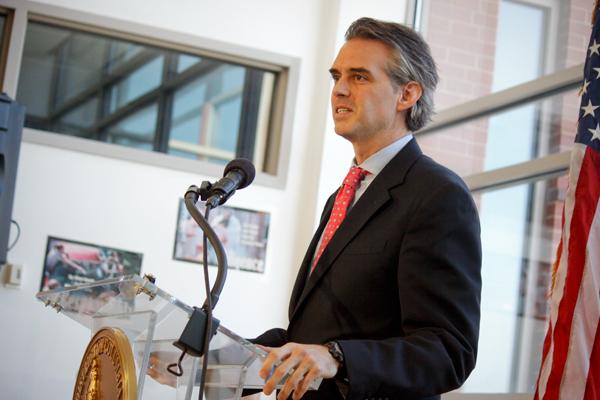
August
Top officials fire business school dean
Business school dean Doug Guthrie was fired after the school overspent its budget by $13 million. He helped lead the University’s efforts to extend its reach in China, though plans to build a campus there fell through in the winter. Guthrie alleged that a top leader in the Faculty Senate ran a smear campaign against him in an attempt to oust him as dean.
Juniors to live on campus
The University announced it would require students to live on-campus through junior year, starting with the Class of 2018. The cost to live in some residence halls jumped as much as 12 percent in the last year, though GW made cheaper options available to juniors. The University is preparing to upgrade buildings like The Dakota, International House and City Hall this summer as part of its seven-year renovation plan.
September
Administrators revamp sexual assault policy
The University removed a two-year time limit to formally report sexual assaults after student leaders fought against the restriction. The limit made GW an outlier among at least 50 other universities, and experts said it could have impacted whether a survivor decided to report his or her attack.
October
GW admits it is “need-aware”
For the first time, administrators admitted publicly that they move some applicants to GW’s waitlist if they cannot afford to pay full tuition, setting off a storm of media attention. Laurie Koehler, senior associate provost for enrollment management, said the policy helps GW meet enrollment goals and students’ financial need. The total number of students that GW places on its waitlist has tripled over the last decade, mirroring a nationwide trend as colleges struggle to predict enrollment totals.
November
Police experience “breakdown in procedure”
Campus police and the Metropolitan Police Department botched their responses to two gun threats on campus in November. City police waited hours to alert the University about an armed robbery, and about a week later campus police hesitated to inform MPD about reports of a gunman in South Hall. The incidents signaled what several UPD officers described as flawed communication with D.C. police.

December
Gray launches reelection campaign
Despite allegations of corruption hovering over him, Mayor Vincent Gray announced in December that he would seek a second term, joining an already crowded field. Gray, an alumnus, lost the primary in April to D.C. Council member Muriel Bowser, who captured 44 percent of the vote. The month before, D.C. businessman Jeffrey Thompson told federal prosecutors that Gray knew about a more than $600,000 shadow campaign Thompson funded to prop up the alumnus’ 2010 bid.
January
Freshman dies on the Mount Vernon Campus
Freshman Sean Keefer, a Clark Engineering Scholar, was found dead in his West Hall bedroom on Jan. 21. The D.C. medical examiner later ruled the death a suicide. Keefer was originally from West Linn, Ore. and was remembered by professors, friends and family as a brilliant student.
February
GW takes over an art school
In February, the University announced a historic merger with the Corcoran Gallery of Art and the Corcoran College of Art + Design, marking GW’s largest academic takeover in more than a decade. GW will take control of the 115-year-old Beaux Arts building on 17th Street and run the college, while the Corcoran’s 17,000 pieces of art will be housed in the National Gallery of Art.
March
Knapp announces health center move
University President Steven Knapp announced in March that Student Health Service and the University Counseling Center would move from K Street to the Marvin Center by early 2015. The decision came after Student Association president Julia Susuni pressured administrators to move the offices to a more centralized location.
University receives historic donation
Billionaires Michael Milken and Sumner Redstone gave a combined $80 million to the public health school. The Milken Institute contributed $40 million to the school, which was renamed the Milken Institute School of Public Health. The donations, the University’s largest-ever, will go toward funding research on chronic diseases such as obesity.

Men’s basketball’s historic season comes to an end
For the first time since 2007, the men’s basketball team made it to the NCAA Tournament. The team, once picked to finish 10th in the Atlantic 10 Conference, ended its season in third at 24-9 – tied for the second-most wins in program history. The Colonials fell to Memphis 71-66 in the second round of the tournament.
April
Counseling center to offer services on the Vern
Freshman Benjamin Asma and senior Lynley Redwood both committed suicide in their West Hall rooms on the Mount Vernon Campus, shaking a tight-knit campus that had already been touched by loss earlier in the semester. After the deaths, the University announced it would permanently place counseling services on the Vern starting in the fall.
Senior fatally struck by car
Senior Carlos Pacanins died after he was hit by a car in College Park, Md. on April 11. He was the fourth pedestrian to be struck by a car at the intersection since July 2013, which prompted a wave of efforts to improve what local police called a problem area. The city stationed officers on street corners, installed temporary lights and placed large signs near the crossing.
May
Corcoran merger details emerge
The University announced it will spend $25 million on initial renovations to the Corcoran. Knapp said funding for the renovations would come in part from fundraising. Corcoran students could pay GW’s full tuition in the future, depending on how the University decides to absorb the school into the Columbian College of Arts and Sciences.
José Andrés keynotes Commencement
Celebrity chef José Andrés delivered the keynote address to the Class of 2014 on the National Mall, joking that he was shocked the University picked him for the honor. The chef and former adjunct GW professor, who also serves on GW’s Urban Food Task Force, urged graduates to pursue “the new American Dream.”




